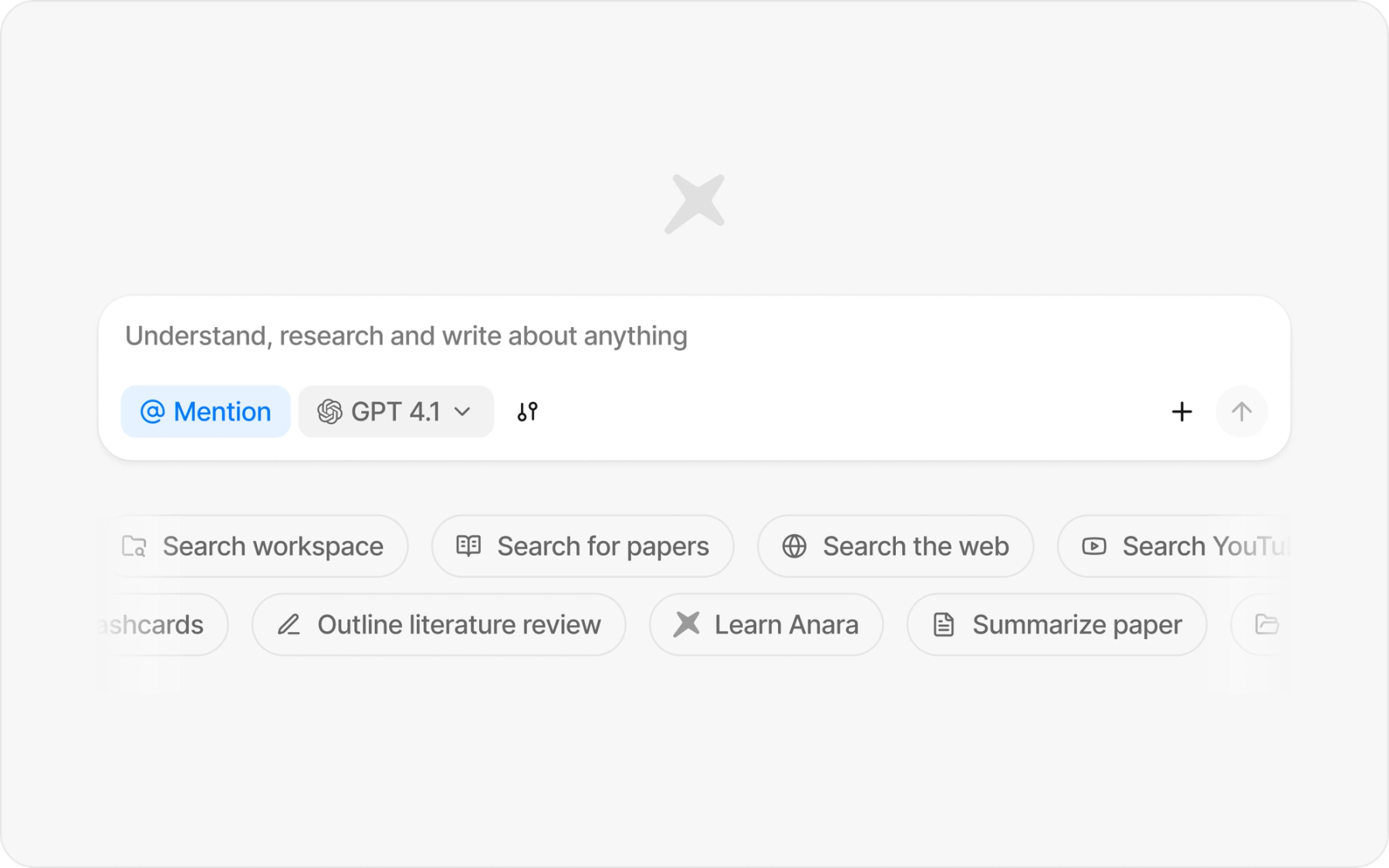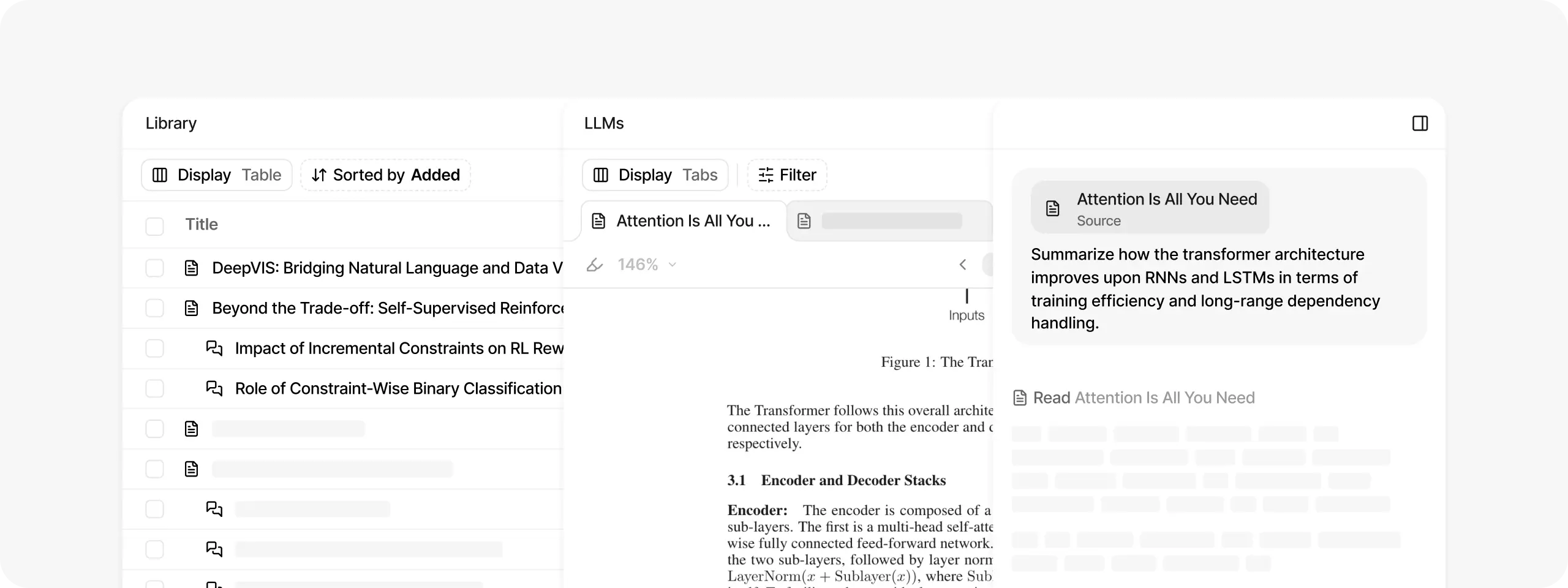Must-Try SciSpace Alternatives and Complementary Tools [2025]
1. Anara
Anara is a SciSpace alternative offering specialized agent ecosystem designed for academic workflows. While SciSpace offers PDF annotation and basic AI chat, Anara deploys research-specific agents that automate systematic literature reviews, academic database discovery, and multi-source synthesis. It automates research workflow that other Scispace alternatives cannot match.
Both platforms offer AI tools for literature review, summarization, and AI citation generator, Anara's fast-growing AI research assistant rivals SciSpace in the academic technology space.

What are Anara’s best features?
- Multi-source research synthesis: @Research agent draws insights from your library, academic databases, and web sources with chunk highlighting verification
- Academic database integration: @SearchPapers accesses millions of papers from major databases directly within research workflows
- Systematic review automation: @CompleteForm takes research templates and systematically extracts data across literature collections
- Comprehensive multimedia analysis: Video processing and analysis across PDFs, audio, images, and handwritten notes
- Collaborative agent deployment: Shared workspaces where teams deploy research agents across collective libraries and projects
- Complete workflow automation: From @CreateCitation for references to @Create Flashcards for study materials, agents handle entire research lifecycles
- Source verification: Every agent response links to exact source passages across all content types and sources
With Anara, I can quickly review abstracts, get summaries of papers, and receive suggestions about key findings, which significantly improves the quality of my work.
Medical rehabilitation researcher
Who is Anara for?
Anara serves researchers, academics, and teams who need systematic research workflow automation rather than basic PDF annotation. Its specialized agents make it particularly valuable for interdisciplinary researchers, collaborative research teams, and anyone requiring coordinated literature analysis, data extraction, and multi-source synthesis—comprehensive research capabilities that general alternatives like SciSpace cannot provide.
Pricing
- Free: 10 basic + 4 pro messages daily, 10 uploads/day, 120 pages per file - Sign up now!
- Pro ($12/month): Unlimited messages and uploads, premium AI models (Claude 4 Sonnet, GPT-4, etc.), 10,000 pages per file, collaborative workspaces
- Team ($18/seat/month): Everything in Pro plus team management, shared editing, admin controls, and dedicated account manager
Deploy specialized agents for discovery, analysis, and synthesis in one platform
Switch to Anara for free2. Consensus
Consensus is an AI-powered academic search engine that provides evidence-based answers to research questions by synthesizing findings from over 200 million peer-reviewed papers. It focuses on direct Q&A and summarizing scientific consensus, rather than PDF annotation or manuscript writing.
Where Consensus fundamentally differs from SciSpace is in its focus on answering specific questions rather than just analyzing individual papers. Its "Consensus Meter" helps researchers quickly understand the degree of agreement across multiple studies on particular research questions.
Best features
- AI search across 200 million peer-reviewed papers
- Evidence-backed summaries with direct citations
- Advanced filters for precise research queries
- Consensus Meter to visualize agreement levels
- Copilot assistant for research question refinement
Pricing
- Free tier with basic features
- Premium at $11.99/month or $107.88/year
3. Elicit
Elicit is an AI research tool designed to automate literature reviews, summarize papers, and extract key data. Unlike SciSpace, which offers PDF chat and writing tools, Elicit excels in systematic reviews and research brainstorming with its structured data extraction approach.
Researchers particularly value Elicit's ability to extract specific methodological details and study characteristics across multiple papers, creating structured tables that facilitate comparison. This systematic approach provides an alternative to SciSpace's more narrative-focused paper analysis.
Best features
- Semantic search across 125M+ academic papers
- Literature review automation with structured data extraction
- PDF upload and analysis with precise information extraction
- Research question generation and refinement
- Study comparison with tabulated findings
Want to compare tools? This article on alternatives to Elicit lays out the strengths of other platforms.
Pricing
- Free basic plan
- Plus a $12/month with expanded features
- Pro at $49/month for advanced systematic review
4. Research Rabbit
Research Rabbit visualizes research networks, making it easy to explore citation relationships and discover new papers. While SciSpace is more focused on document interaction and manuscript support, Research Rabbit excels at mapping literature connections and discovering related research through visual exploration.
Often described as the "Spotify for research papers," Research Rabbit's recommendation algorithm learns from your reading habits to suggest relevant papers that standard keyword searches might miss. This visual, network-based approach offers a different discovery paradigm than SciSpace's more direct document analysis.
Best features
- Visual citation maps showing paper relationships
- Personalized recommendations based on reading patterns
- Co-authorship networks for discovering related researchers
- Interactive exploration of research landscapes
- Alerts for new publications in tracked areas
Before you decide on Research Rabbit, review this list of Research Rabbit alternatives to find the best fit for your workflow.
Pricing
- Completely free to use
5. Scite.ai
Scite.ai provides smart citations and context for scientific claims, helping users assess the reliability of research. While other SciSpace competitors offer broader research and writing tools, Scite is specialized in citation quality and analysis, showing whether papers have been supported or contradicted by subsequent research.
For researchers concerned with finding reliable sources, Scite's ability to show whether subsequent research supported or contradicted a paper's findings provides context that SciSpace cannot. This makes it particularly valuable in fields where initial findings may be later refuted.
Best features
- Smart citations with classification as supporting, contrasting, or mentioning
- Supporting/refuting evidence for scientific claims
- Citation trend dashboards showing paper reception
- AI assistant for finding evidence on specific topics
- Analysis of 1.2 billion citation statements from 181 million sources
Want more than what Scite offers? Discover a range of Scite.ai alternatives that may be a better fit for your research needs.
Pricing
- Personal at $20/month or $144/year
- Custom pricing for enterprises
6. Paperguide
Paperguide is an AI research platform for managing citations, summarizing sources, and streamlining academic writing. Its strengths are citation extraction and organization, while SciSpace offers deeper PDF and manuscript features.
Academic researchers particularly value Paperguide's ability to generate publication-ready literature review sections with properly formatted citations, saving hours of writing time while maintaining academic rigor. Its integration with 1000+ citation styles eliminates the need for separate reference managers.
Best features
- AI citation extraction and management
- Instant summaries and key point identification
- Browser extension for capturing web sources
- Support for major citation styles
- Research organization and library management
Pricing
- Free plan available with basic features
- Paid plans start at $9/month (billed annually)
7. Jenni AI
Jenni AI is an AI writing assistant focused on academic essays and papers, offering autocomplete, citation suggestions, and grammar improvement. Compared to SciSpace, Jenni is more writing-centric and less about literature discovery or PDF interaction.
What distinguishes Jenni from SciSpace is its emphasis on the writing process itself, with AI-powered assistance that may help researchers overcome writer's block and improve readability. It's a helpful research tool for students, early-stage writers, and non-native English speakers who need help with drafting and organizing basic academic content.
However, advanced researchers and post-grad students seeking in-depth, technically accurate content may find it less suitable for their needs.
Best features
- AI autocomplete for academic writing
- Basic citation generation in multiple styles
- Grammar and readability improvement
- Outline and thesis generators
- Distraction-free writing interface
Jenni is popular, but not perfect. This overview of Jenni AI alternatives explains where other tools do better
Pricing
- Free trial with limited features
- Paid plans start around $20/month
8. genei
genei is an AI-powered summarization and research management tool, ideal for extracting insights from large volumes of documents. SciSpace offers more PDF interaction, while genei excels at rapid summarization and organization of research materials.
Researchers particularly appreciate genei's ability to process multiple documents simultaneously, extracting key information and creating concise summaries that highlight the most important findings. This efficiency makes it valuable for preliminary literature reviews where rapid comprehension is essential.
Best features
- AI summarization with key point extraction
- Keyword identification and concept mapping
- Multi-document analysis and comparison
- Cloud-based notes and annotation system
- Project organization for research management
Pricing
- 14-day free trial
- Basic plan at £9.99/month
- Pro plan at £29.99/month
9. ChatPDF
ChatPDF lets users upload PDFs and interact with them via chat, providing summaries and answers to questions. It is highly focused on PDF Q&A, similar to SciSpace's chat features, but lacks broader research workflow tools.
The simplicity and focus of ChatPDF make it an appealing SciSpace alternative for researchers who primarily need quick answers from specific documents without the complexity of a full research platform. Its straightforward interface requires a minimal learning curve, making it accessible to less technical users.
Best features
- PDF chat with natural language queries
- Instant document summaries and key points
- Multilingual support for international researchers
- Cited answers linked to specific document sections
- Chrome extension for seamless workflow integration
Pricing
- Free (2 PDFs/day)
- Plus at $19.99/month for unlimited PDFs
10. QuillBot
QuillBot is an AI writing and paraphrasing tool for improving clarity, coherence, and originality in academic and professional writing. It complements SciSpace's writing features but is less focused on literature discovery or PDF interaction.
What makes QuillBot stand out among other SciSpace’s competitors is its sophisticated paraphrasing technology that helps researchers express ideas in their own words while maintaining accuracy. This may be particularly valuable for non-native English speakers and researchers concerned about accidental plagiarism.
Best features
- Paraphrasing with multiple style options
- Summarization of complex texts
- Grammar checking and writing enhancement
- Citation generator for reference management
- Readability analysis and improvement suggestions
Pricing
- Free plan with core features
- Premium at $9.95/month
11. Iris.ai
Iris.ai is an AI-powered research assistant for literature mapping, summarization, and exploration of scientific connections. It excels in interdisciplinary research and concept mapping, while SciSpace is broader in workflow integration.
With over a decade of experience in AI-driven knowledge management, Iris.ai offers sophisticated analysis capabilities that may be particularly relevant for fields requiring rigorous methodology assessment. Its visual approach to literature exploration paired with data extraction tools makes it a valuable SciSpace alternative for complex systematic reviews.
Best features
- Literature mapping with relationship visualization
- AI summarization across multiple sources
- Visual concept maps for research exploration
- Workflow automation for systematic reviews
- Interdisciplinary connection discovery
Pricing
- Free trial with basic features
- Paid monthly, quarterly and annual subscriptions
Is SciSpace sufficient for a complete research workflow?
SciSpace provides valuable PDF analysis and annotation features, but researchers often find it insufficient as a standalone solution for comprehensive research workflows. Its limitations in handling diverse content types, team collaboration, and end-to-end research management lead many to seek alternatives or complementary tools.
Many researchers report finding greater value in platforms like Anara that deploy specialized agents for complete research automation. @SearchPapers provides academic database discovery that SciSpace lacks, @CompleteForm automates systematic data extraction that PDF annotation cannot handle, @Research synthesizes insights across multiple sources beyond individual documents, and collaborative agent deployment enables team research workflows that individual PDF tools cannot support.
The key difference? SciSpace handles PDF analysis within fragmented workflows, while Anara's agent system automates complete research lifecycles from literature discovery through systematic analysis to citation generation. The ideal solution depends on whether you need basic PDF annotation or comprehensive research workflow automation that eliminates tool switching and provides verifiable, multi-source insights.
